Building a culture that leads to improved business performance
There is plenty of research to suggest that a positive organisational culture leads to improved performance, but figuring out what culture is right for your organisation and how to deliver it can be a challenge.
Dr John Mervyn-Smith, Chief Psychologist, and Dr Nigel Evans, Psychologist at large, C.Psychol, Director of NEC, Chair of the European Board of Assessment (EFPA) , at The GC Index tell us the key ingredients to building a better organisational culture…
Organisational culture has been defined by social scientists and management theorists as:
‘The collective beliefs, values, attitudes, behaviours and communication styles of people who work within an organisation.’
A definition such as this is so broad as to be meaningless and has led researchers and practitioners to find ways to define and measure each of these characteristics of organisational life.
In turn this has led to complex models and measures that bring any and all aspects of organisational functioning into the spotlight and often with a focus upon ‘pain points’ rather than health:
“Let’s measure everything and see where it hurts!” Is often where most cultural diagnostics and solutions start.
The risk with this approach is that it becomes symptomatic rather than systemic. So, for example, a culture survey that returns the observation that people feel bullied at work can lead to a generalisation of a ‘bullying culture’. In turn the intervention may involve putting managers through a series of workshops about bullying at work.
The danger then is that the focus is upon the symptoms rather than the causes. Moreover, culture change is often shaped explicitly or implicitly by the view that ‘we want this to be a nice place to work’ and driven by ‘what employees want’ rather than with a focus on the question: ‘what do we want our organisational culture to be like so that it supports the achievement of business goals?’

‘How’ decisions are made in organisations will shape and change the culture.
Our approach to understanding organisational culture is to ask the question: ‘How do ‘the collective beliefs, values, attitudes, behaviours and communication styles of people who work within an organisation’ have a tangible, measurable impact upon the performance of a business/organisation?’
The answer is quite simply in how decisions are made.
How decisions are made, formally and informally, maintains, shapes and changes organisational cultures.
Therefore, in order for us to understand organisational culture we need to ask the question: ‘How do key decisions get made in our organisation?’
How decisions are made will, of course, underpin the organisations readiness and approach to transformational change.
The GC Index® framework provides us with a practical model for understanding this aspect of organisational culture; the ‘headlines’ are presented below*…
The Strategist Culture is ‘planning-centred’
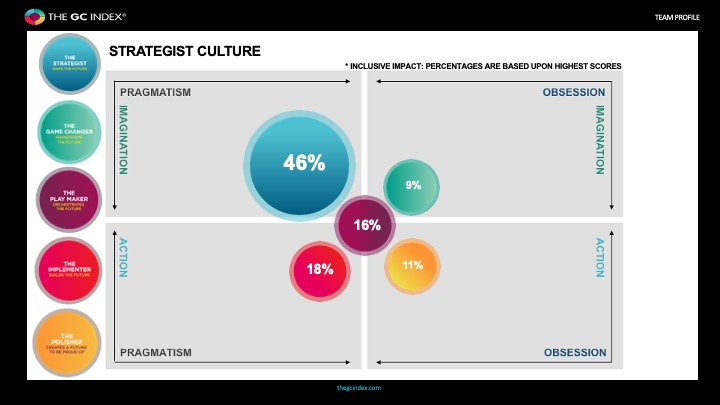
Our data shows 46% of Board Directors have strong Strategist GC Index® profiles, compared to 22% in the general population.
Strategist culture is ‘planning-centered’.
Strategists can see the ‘bigger picture’, the patterns and trends in their world. Strategist decisions will reflect a value placed upon a systematic analysis of data that describe patterns.
An analysis of historical events will provide a basis for making predictions (decisions) about the future. So, decisions, in this regard, will be rooted in the past.
Strategist cultures value structure and order; they value intellectual and analytical skills and a degree of objective detachment when it comes to making business and people decisions.
The Game Changer Culture is ‘possibility-centred’
46% of business owners have strong Game Changer profiles (compared to 25% of all employees).
Game Changers are ‘possibility-centered’. They are not wedded to what has gone before. Indeed, a strong drive for creative expression means that they value possibilities that can reflect their uniqueness.
The Game Changer culture then, values creativity, freedom, autonomy those ingredients needed for creative expression.
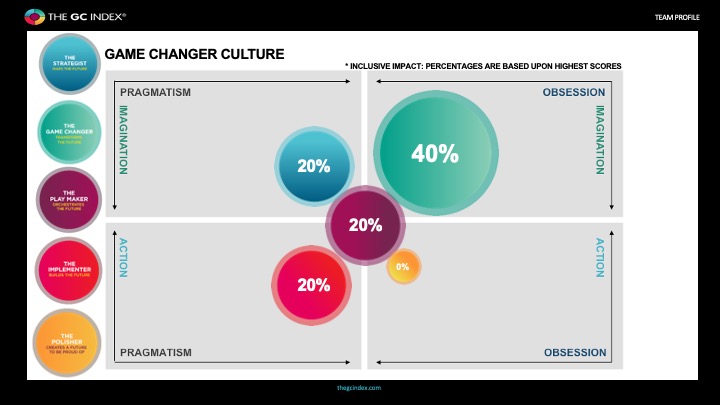
The Play Maker Culture is ‘people centred’
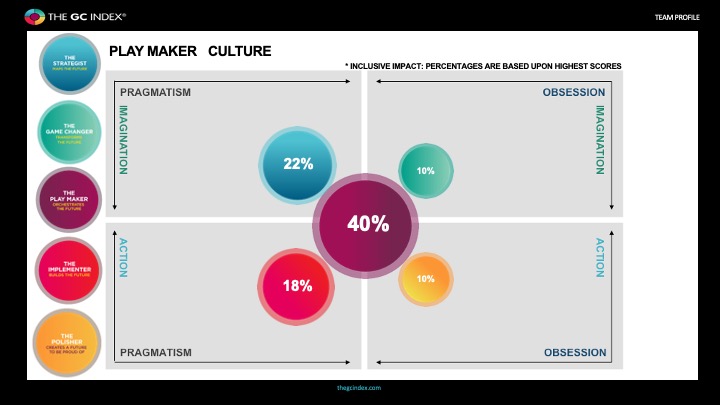
Play Makers value inclusion, involvement, collaboration, partnership and cohesion.
The Play Maker culture is ‘people-centered’. The philosophy is: ‘If we treat our people well then success will follow’.
Decisions then, about business and about people, will reflect this drive to make the world of work a place that people want to be, where they can make a contribution, grow and develop.
The Polisher Culture is ‘progress centred’
‘Those who fail to learn from history are doomed to repeat it’.
Polishers value learning and review. Polisher cultures are ‘progress-centered’.
These core values underpin cultures that nurture continuous improvement, the pursuit of excellence and innovation.
Polishers are constantly alert to how things can be improved and developed. They will thrive in academic settings and organisations underpinned by the rigorous exploitation of science.
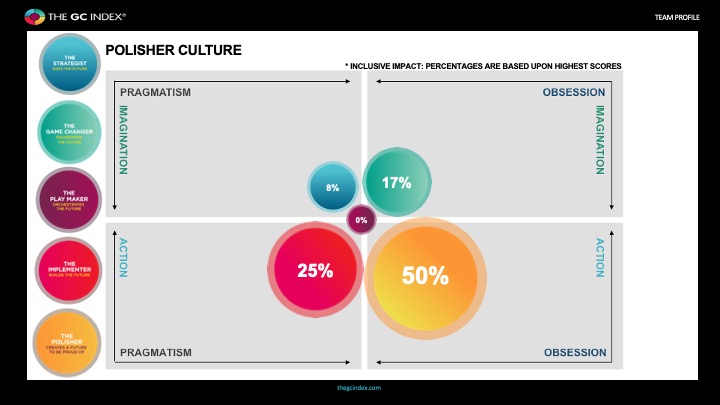
In a Polisher culture, decisions will be based upon a rigorous analysis of facts and details, often to a painstaking extent. ‘Sloppy’ thinking and ‘good enough’ outcomes will often not be tolerated.
For Polishers, ‘if a job is worth doing, it is worth doing well’; the culture will be one of pride in what’s achieved, and decisions will reflect this.
The Implementer Culture is ‘pragmatism centred’
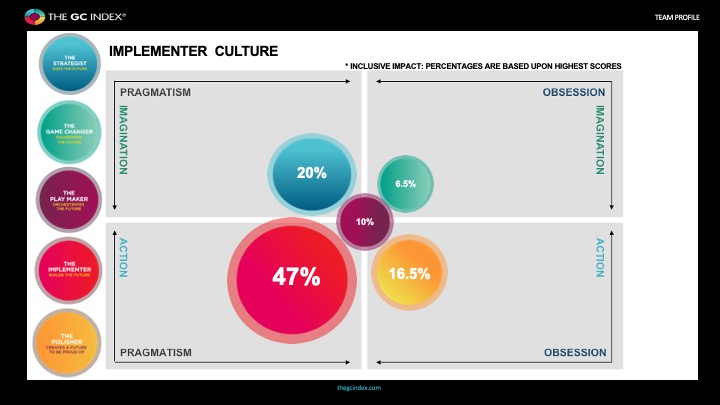
Implementers are pragmatic. They value the ‘tried and tested’, the traditional ways of doing things. They value the direct experience that ‘tells’ them whether or not something is possible.
Implementer cultures are ‘pragmatism-centered’: people are happy to ‘fix’ rather than perfect.
Decisions in Implementer cultures will reflect a pragmatic focus upon practicalities. “If it isn’t broke, don’t fix it…” or “…it worked last time so there is no need to change it…” are often how decisions get made in an Implementer culture.
*We have focused on one dimensional organisational cultures for the purpose of this article and high level understanding for the reader. The GC Index multi-dimensional impact model will apply within a GC Index organisational culture profile, just as it does at within GC Index individual and team profiles.
Leaders need to establish what culture they want…
A recent report from The Chartered Institute of Internal Auditors (Chartered IIA), ‘Cultivating a healthy culture: Why internal audit and boards must take corporate culture more seriously in a post-Covid world’, showed around a quarter (23.2%) of those surveyed believe their board has failed to establish and articulate what culture it wants, despite this being fundamental to the effective leadership, resilience, and governance of an organisation.
This is where The GC Index® comes in. Working with organisations to understand their culture,anchor what culture supports their organisational objectives and more critically provide a universal language where all employees are valued for the positive impact they can bring to the table.
Psychologist at large, Dr Nigel Evans C.Psychol, Director of NEC, Chair of the European Board of Assessment (EFPA) says:
“A major weakness to understanding culture has been a too simplistic or shallow assessment at the group dynamic and intervention level, where culture is embedded.
“Traditional psychometrics are too detailed whilst company surveys miss key nuances. The world has moved on in terms of organisational complexity, interdependency, multicultural awareness, ethical and social responsibility.
“Organisations need an organimetric approach as offered by The GC Index® to better respond positively to the challenges of relationship building, coordination, and group work which contribute to a growth culture.”

What The GC Index® does is provide a language and framework for action, demonstrating how things get done and where people fit into this.
It not only helps us understand cultural differences and provide coping strategies but it gives leaders the data they need to truly understand what culture is right for their organisation.
If you would like to find out more about how The GC Index is helping organisations build cultures that lead to improved business performance please do contact us here.



